From today’s Studio D Radar mailing list:
There are typically two visceral reactions when people first hear about the Short Walk expeditions. The first is the assumption that we are venturing into a war zone, when the reality is that this corner of Badakhshan province has been peaceful for thirty+ years. If the Taliban or any other armed group was active in our field of operation the expeditions will be delayed or cancelled and we’d instigate a Plan B.
The second reaction is an assumption around fitness. While one needs to be physically fit, our screening interviews focus on cultural and team dynamics—everyone needs to be aligned to the mission, and be willing to work for the wellbeing of the group, something we refer to as “one body principle” a term coined by our 2018 Medic Sam Kellogg. When interviewing candidates there are four major challenges we discuss in addition to fitness: operating at high altitude for extended periods, long distance trekking, developing country, and higher risk travel. All of our 2019 Short Walk team had experience of at least one of these attributes, but no-one (other than Jan, the expedition leader with experience in all five) had experience in more than three on a single trek. In summary: humans that manage to work well as a team are pretty resilient.
File this in the same folder as the references I quoted in Human Infrastructure, Sex and Cycling last week: embrace your infrastructure as you find it, and focus, instead, on the personal, cultural and social issues layered on top of it.
Having a kombucha bar slash lunch spot slash farm stand a quick cycle away proved helpful when I started supper tonight and realized we had no vegetables.
Farmacy & Fermentary—from they of Heart Beet Organics—is on Great George Street in the space, next to Timothy’s, formerly occupied by the late great Café Soleil. It is a worthy successor.
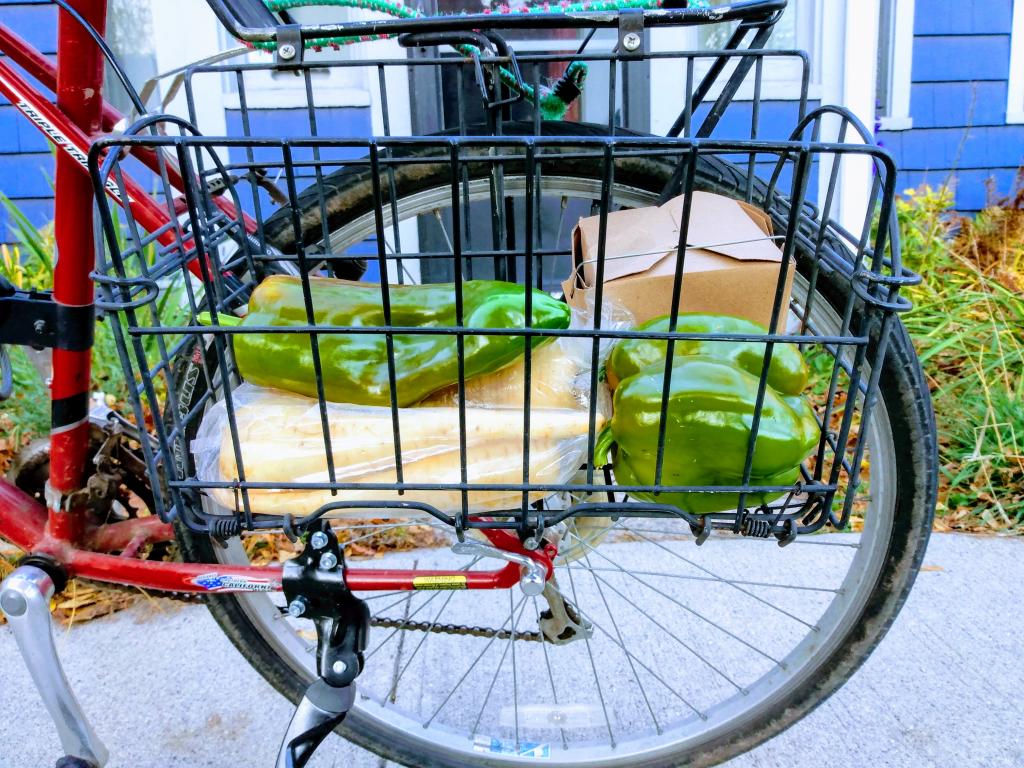
Elizabeth May’s letter to Prime Minister Trudeau is a well-worded setting of the table for a more collaborative Parliament.
I walked up the stairs to a well-kept building downtown that houses three apartments and rang the bell for the one housing Green Party supporters. I heard some shuffling inside, the door opened, and I was greeted by a woman on the telephone, motioning for me to wait a moment.
As I stood by, I could not help but overhear the person on the other end of the line, as the volume on the phone was very loud:
The RCMP are going to transfer $1,000 into your bank account, and this will then act as a sting operation for the group that hacked into your account; they will go to the nearest Google Store and take out the money, we will be alerted, and then…
And so on. As I listened, it became evermore evident that this was a very skilled phone scammer at work.
Eventually I could listen no longer: “this person is lying to you,” I chimed in; “I suggest you hang up the phone and call the police.”
I offered to take the phone from her, and once I was speaking to the scammer, I asked for his name, ID number and company. He gave me an Ottawa phone number, and told me he wasn’t from a company, but was from “Weasel.” Okay.
I finished things up: “you are lying, you are committing a crime; I am going to hang up now and we are calling the police.”
I found out that he’d kept her on the line for almost an hour with a never-ending stream of twists and turns, all just plausible enough that she’d been afraid to hang up.
I reassured her that she’d done nothing wrong, and that she was the victim of a very convincing scam artist. I recommended that she have a cup of tea, and then phone her bank and the police to report the incident.
And then, only when she’d had a chance to catch her breath, make her way to the polls.
Just one of the many adventures I had touring around Charlottetown as part of the Green Party “get out the vote” effort yesterday.
My day started at 7:30 a.m. at the Green “sign wave” in West Royalty; after a quick stop at Green Party HQ in Sherwood, I dropped Oliver home and set out on my appointed rounds.
My job was to take poll-by-poll lists of previously-identified Green supporters and visit each one, knocking on their door to see if they needed a ride to the polls or had any other concerns, leaving a door hanger if they weren’t home. I started out, ambitiously given my brooding chest cold, on my bicycle, covering the downtown polls from the east end to Haviland.
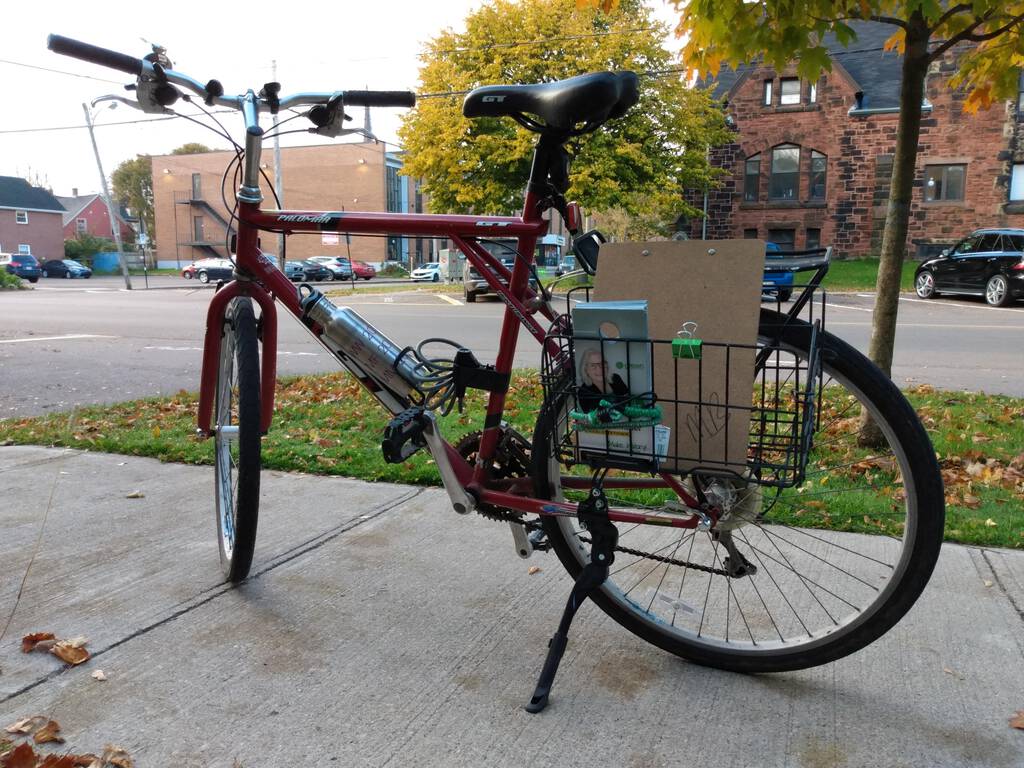
I met a lot of interesting people, set up some rides to the polls, left a lot of door hangers. I visited people in the swankiest of buildings and the humblest of buildings. I learned that there’s no way to predict who’s going to be a Green supporter.
Once I’d finished my downtown polls, I drove back out to HQ, wolfed down some lunch (Greens, I have discovered, have the best food of any of the political parties), and left with a new sheaf of lists, this time for the area between University Avenue and Queen Elizabeth Drive, a swath of town that also encompasses a full spectrum of housing and income levels. For this round I loaded my bicycle into the trunk of my car and set up a base on Admiral Street, cycling around in concentric circles until I had everyone covered, and then moving east and doing it all again.
I got upbraided for knocking the door while the children were sleeping (sorry!), barked at by a lot of dogs, experienced every possible model of doorbell and house number, and thanked by more than one family for the reminder to vote. I visited a building with a comfortable chair inside the elevator.
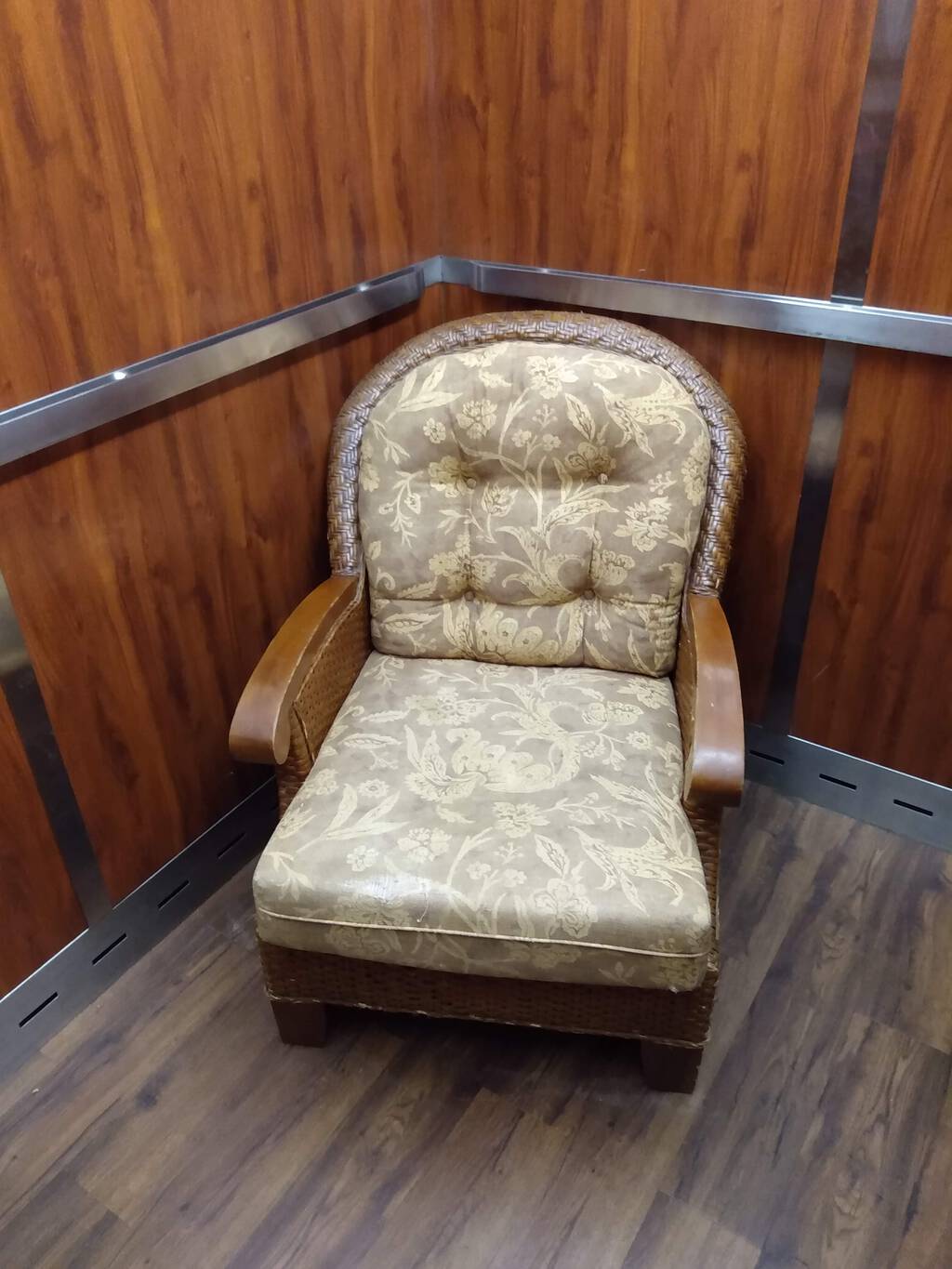
Back to Sherwood for more.
My next round was along Kensington Road from the 1911 Jail out to the Belvedere Golf Club.
I found apartment buildings in places I had no idea apartment buildings existed.
I helped a man load a heavy set of flat-pack furniture into his office.
I discovered streets that I had no idea existed.
I found one short street in Parkdale where almost every single house was identified as “Strong Green.”
I encountered apartment buildings with broken intercoms, apartment buildings with no intercoms, apartment buildings where the intercom rang the resident’s cell phone, and apartment buildings where the intercom needed instructions from the 1950s to use.
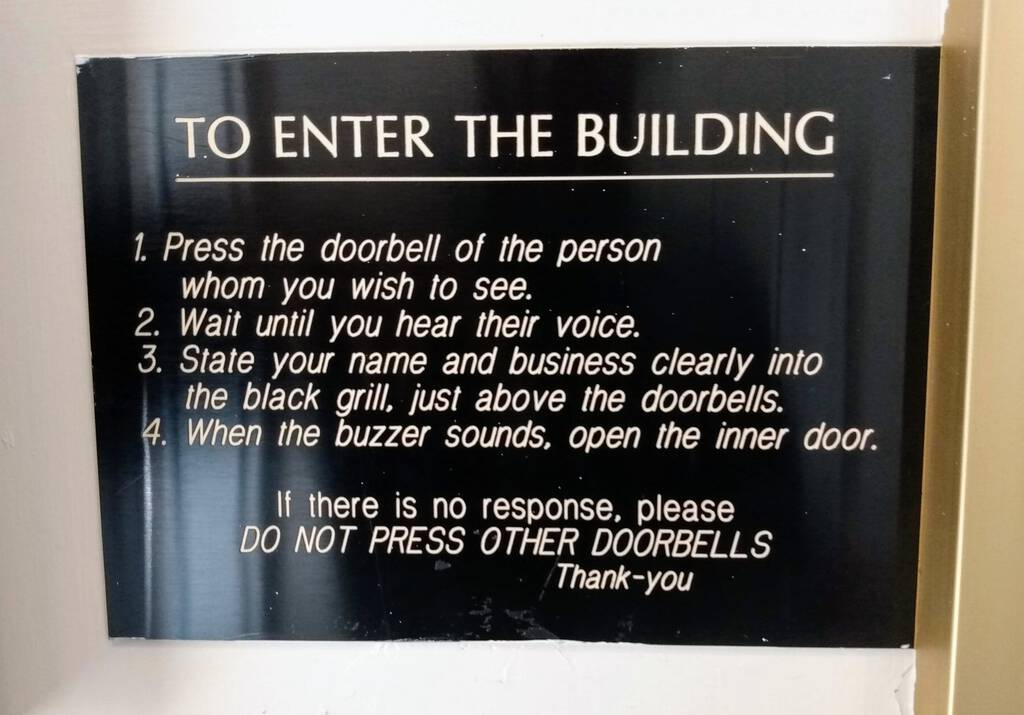
Back to the office. One more round, this time the area north of Holland College into Parkdale: Edward, Esher, Fitzroy, Belmont, Spring, Second, Park, Pleasant.
It was getting dark. I was starting to feel the effects of the day: my mind was starting to get foggy, and it was getting more difficult to keep track of things.
On Pleasant Street, which is only 150 metres long, I managed to lose my car. Then, after a minute, I found it.
I tried to find addresses on Walthen Drive that, perplexingly, did not exist. I realized that I was canvassing Walthen Drive using street numbers for Hensley Street. In there somewhere I canvassed the right number on the wrong street, addressed the person who answered the door by the (presumably wrong) name, and was assured that the Greens had her support.
I encountered one woman who said simply “I don’t vote.” I had no comeback for that.
At another door, a solid Green supporter who didn’t know whether he’d have time to make it to the polls. I made sure he got a callback before the deadline. I hope he voted.
At 7:30 p.m. I realized that I couldn’t go on any longer: my mind and body were at their end, and I was scheduled to scrutineer the vote count at 8:15 p.m. I made a final trip to Sherwood, dropped off my supplies, grabbed a slice of pizza, and drove home.
After a quick sit-down at home, I headed next door to the Murphy Community Centre for my last task of the night.
Despite my years of working in election administration, I’d heretofore never seen a ballot box being emptied of ballots and counted, so, beyond any duty to democracy and the Green Party, I was also following my curiosity. And it was fascinating.
But, before the poll even closed and the count commenced, there was one final adventure: an elector arrived at the poll only to find that they were in the wrong place. They were supposed to vote across town. But they had no way of getting there in time on their own. Elections officials were confounded as to what to do, and looked over at we scrutineers–there was only me, for the Greens, and a couple from another party. When the other party demurred, I received assurances that I could re-enter the poll if I stepped out to see what I could do. I phoned HQ and asked if there was anyone who could rush down and drive; none other than (Green MLA) Hannah Bell, champion of democracy, stepped into the fray. She was at the front door in record time. I haven’t heard yet as to whether the elector got to the other poll in time to vote, but I hope they did. Just got word that they got to the proper poll by 8:30 p.m., and voted!
At exactly 8:30 p.m. the doors were locked and I watched the poll clerks and deputy returning officers go through the systematic process of shutting down the vote, carefully labeling and sealing many envelopes, tallying the total ballots cast and the total ballots remaining and, finally, unsealing the ballot boxes and counting the votes.
What a thing to watch!
Each ballot was pulled out of the ballot box, the marked candidate’s name read, and then the ballot was shown to all-observing and we each marked a tally sheet to keep the count.
Casey. Campbell. Casey. Lanthier. Lanthier. Byrne. Casey. Lanthier.
Every time a candidate’s total reached another multiple of five, someone would say “tally,” and we’d all double-check and confirm. It was both a humbling direct line to democracy and the closest to full-on-tenterhooks that I’d ever experienced.
In the final count, for the two polls that I was observing, Darcie won poll 53 and placed a respectable second in poll 54.
We observers received a copy of the Statement of the Vote and then, around 9:30 p.m., left with thanks.
I dropped home to pick up Oliver and we walked to the Haviland Club for the Green celebrations.
What a day.
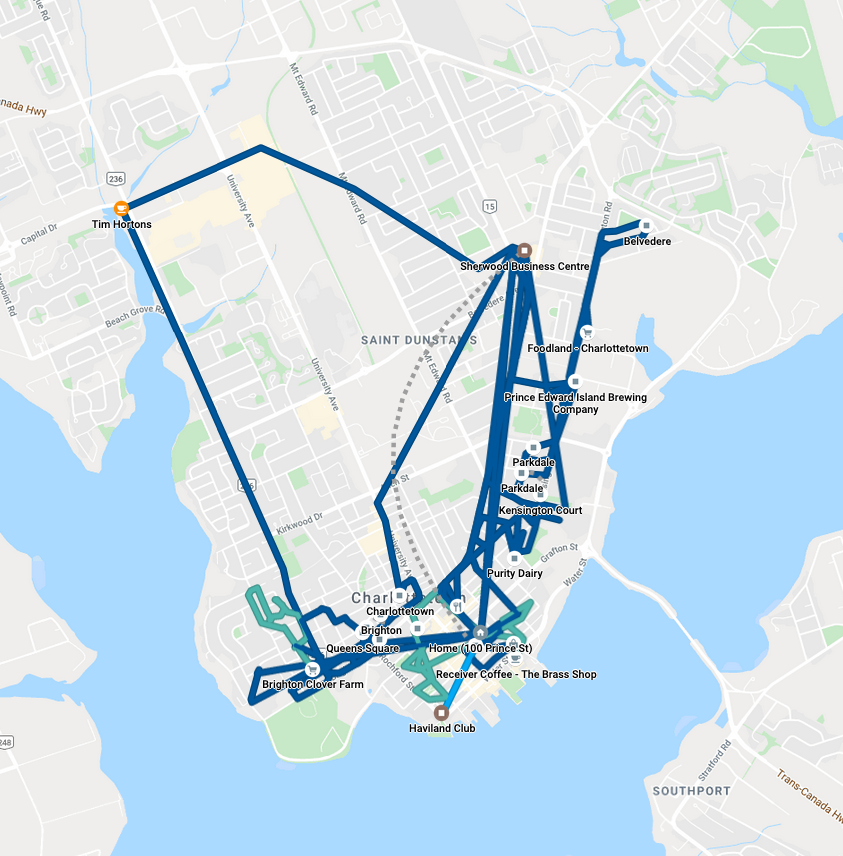
We woke up at 6:30 a.m. today to join a Green “sign wave” at the North River Road-Capital Drive corner.
I’m now shifting to the “get out the vote” ground game, doing a door to door foot canvas downtown, and will finish the day as a scrutineer at the Murphy Centre.
If Oliver can get up a 6:30 a.m. and be out the door by 7:00 to stand on a street corner for an hour, pretty much anything is possible.
Please go and vote today.
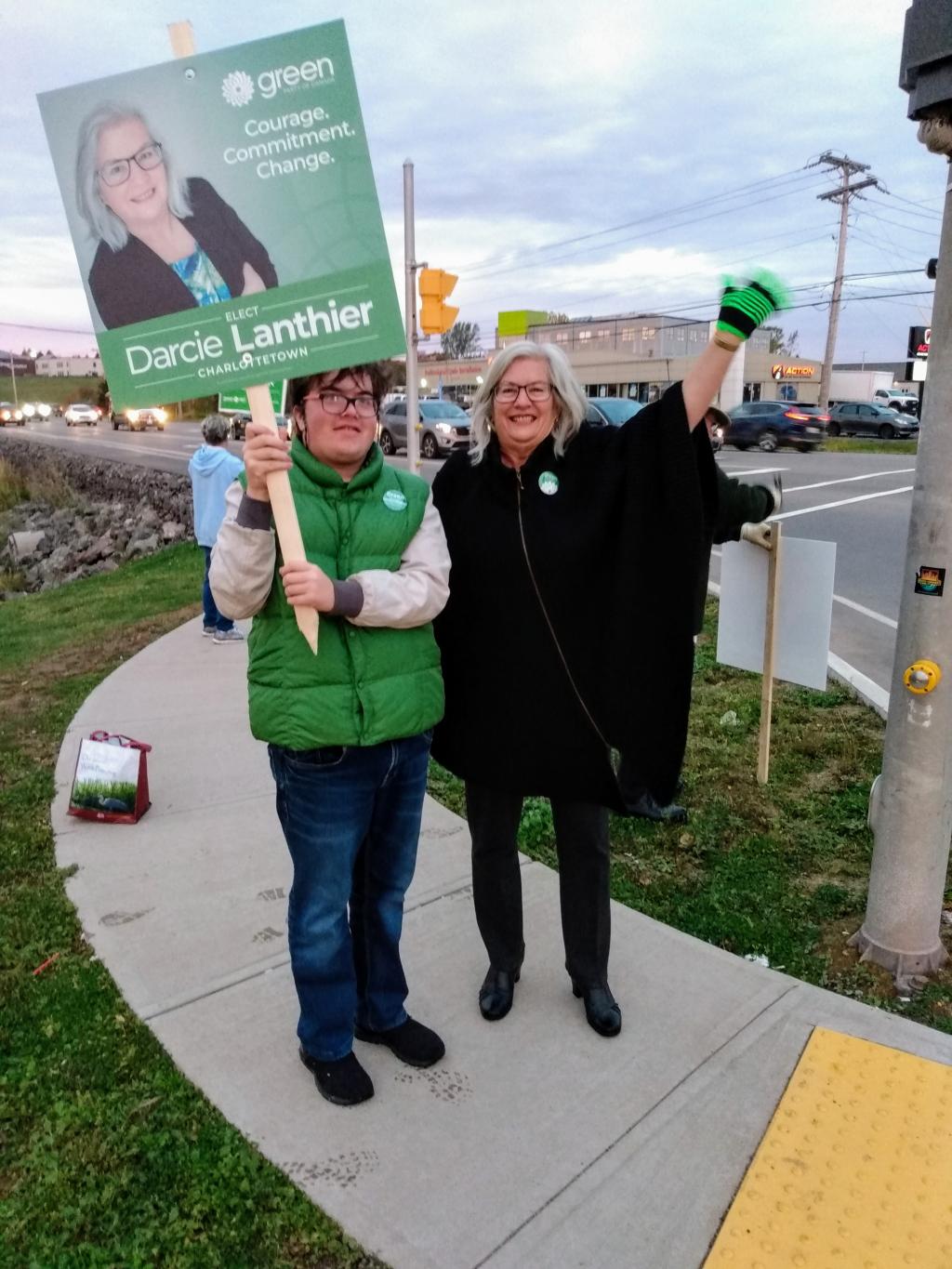
When the Cornwall bypass gets turned on this week, road sections formerly known as “Trans-Canada Highway” will get renamed; Valerie is on top of what they’re getting renamed to.
My friend Ton wrote a special blog post just for me to highlight a feature he added to his blog to make it easier for (and other non-Dutch or non-German readers) to read his non-English posts on translation. And it works!

Looking back over the digital breadcrumbs that Google sprinkles along my daily travels, I realized this morning that I haven’t driven our car at all for the last 15 days.
This hasn’t been part of some grand plan; I’ve simply been able to get around by bicycle and bus for the last two weeks (I did get a car ride home from a friend last week, so I’ve not been completely car-free).
Ironically, this streak will be broken this afternoon when Oliver and I drive out to Green Party HQ in Sherwood to do some volunteer data entry door-to-door brochure drop-off: we’ve both been nursing colds, so cycling out is simply too much, and the bus schedule has an unfortunate midday absence of buses to Sherwood on Saturdays.
From the introduction to Come As You Are: The Surprising New Science that Will Transform Your Sex Life:
And finally, in Chapter 9, I describe the single most important thing you can do to improve your sex life. But I’ll give it away right now: It turns out what matters most is not the parts you are made of or how they are organized, but how you feel about those parts. When you embrace your sexuality precisely as it is right now, that’s the context that creates the greatest potential for ecstatic pleasure.
From the introduction to Bicycle/Race: Transportation, Culture & Resistance, by way of explaining how focusing on building cycling infrastructure misses the mark:
I disagree with this approach, both as an advocate for bicycling and as an anthropologist. The development-based strategy sidesteps key questions about race, place, and mobility: Who decides what to build, who gets paid to build it, and who will frolic in those future streets? If the answers point to inequity, and they very often do, so will the fruits of the strategy. My approach to changing street culture takes a step back from designing new street systems and focuses instead on the human infrastructure that shapes our current mobility. Culture, social networks, who we spend time with; the relational nature of being social creatures plays a fundamental role in where we live, how we travel, who we value, and, crucially, how we transition to more sustainable lifestyles. We carry our identities and histories with us as we mobilize into public spaces like streets, and from within our individual bodies we transmit norms and new ideas. We can’t design a future where race and other hierarchical structures don’t matter in transportation unless we reckon with how they’re embedded in today’s unequal mobility landscape.
Both authors are saying, in essence, the same thing: embrace your infrastructure as you find it, and focus, instead, on the personal, cultural and social issues layered on top of it.
On Wednesday night I had some errands to run: I needed a carbon monoxide detector, some light bulbs, some vitamin D, and some throat lozenges (the latter because I was feeling a cold coming on, a cold that did, indeed, come on like a freight train on Thursday).
In the normal course of affairs I would have run these errands by getting in my car, driving out to Canadian Tire for the CO detector and the light bulbs, and then stopping at Shoppers Drug Mart on University Avenue, on the way back, for everything else.
But, as it happened, earlier in the day on Wednesday I’d received word from Home Hardware that they’d taken me up on my suggestion of installing a City-incentivized bicycle rack; not only did I want to show Home Hardware some love for doing this, but Home Hardware also happens to be a much easier cycle from my house downtown than Canadian Tire, and Murphy’s Parkdale Pharmacy, which is on the cycle home, has excellent bicycle parking too. It also happened to be a nice night for cycling, before a forecast Thursday storm. So the die was cast.
There are a bunch of ways to get from 100 Prince Street to Home Hardware: the most direct involve Longworth Avenue/St. Peters Road or Kensington Road; I hoped that I could avoid the hill involved in either of those routes, and also avoid some car traffic, by taking the Riverside Drive multi-use trail out to Garfield Street and then cutting west to St. Peters Road.
It turned out that Garfield Street too has something of an incline, so I wasn’t able to completely avoid hills. But it was a nicer cycle ride, so I’m happy I went that way; the ride through the Roman Catholic Cemetery was particularly atmospheric, as the lights and candles on the graves made the route feel like a magic realism shortcut into another dimension. Which perhaps it was.
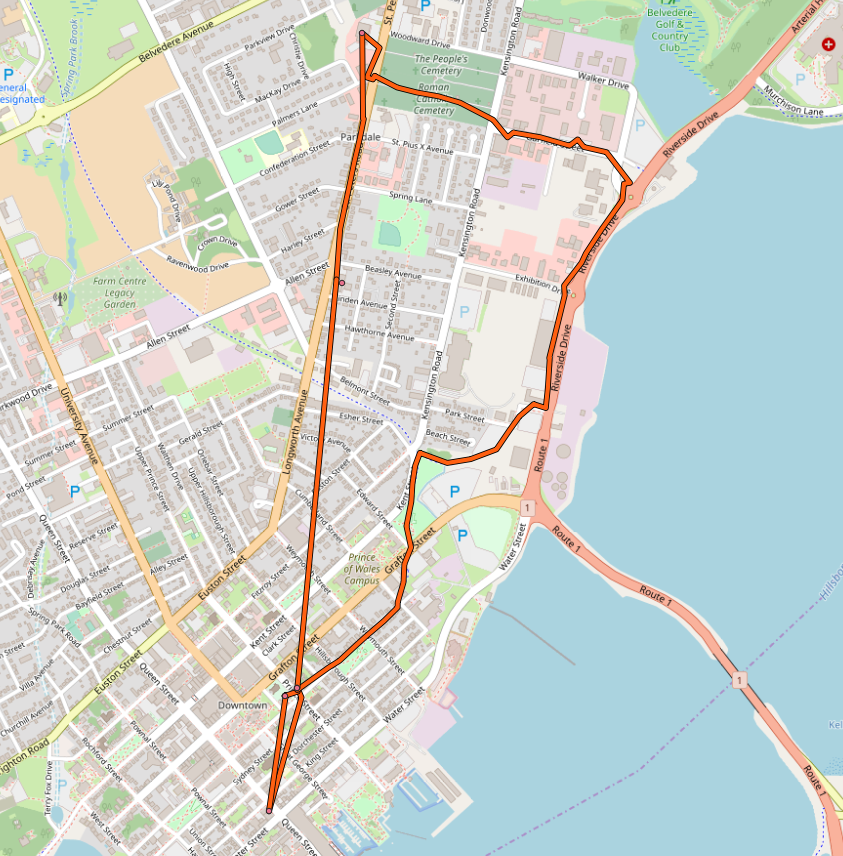
At Home Hardware I did, indeed, find the reported bicycle rack, handy-by the front entrance:
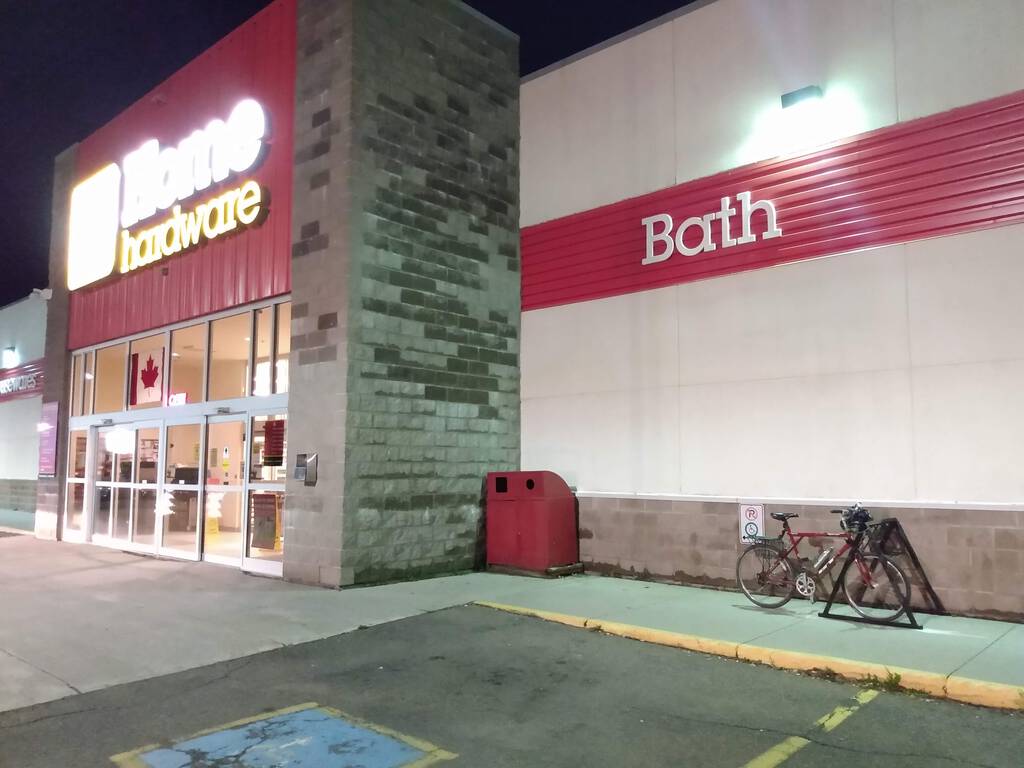
Once I arrived at Home Hardware, I was reminded that, beyond convenient bicycle parking, there are some other good reasons to shop there, including its plentiful, helpful staff (I was asked if I needed help by three separate people; this has never happened to me at Canadian Tire, ever). I found the CO detector and the light bulbs (both on sale!), and was in and out in 5 minutes.
To get from Home Hardware to Murphy’s Parkdale Pharmacy I took advantage of the wide bicycle lane along St. Peters Road that’s almost entirely downhill.
It’s not the best bicycle lane in the world, as there are some storm drains that have sunk into pavement that you need to watch out for, and it’s important to have both a “see” and a “be seen” light on your bike if cycling at night, as there’s a lot of traffic entering and leaving St. Peters Road, but otherwise it’s a pleasant almost-100%-coast.
Parkdale Pharmacy has had good bicycle parking for years and years, right by the front door:
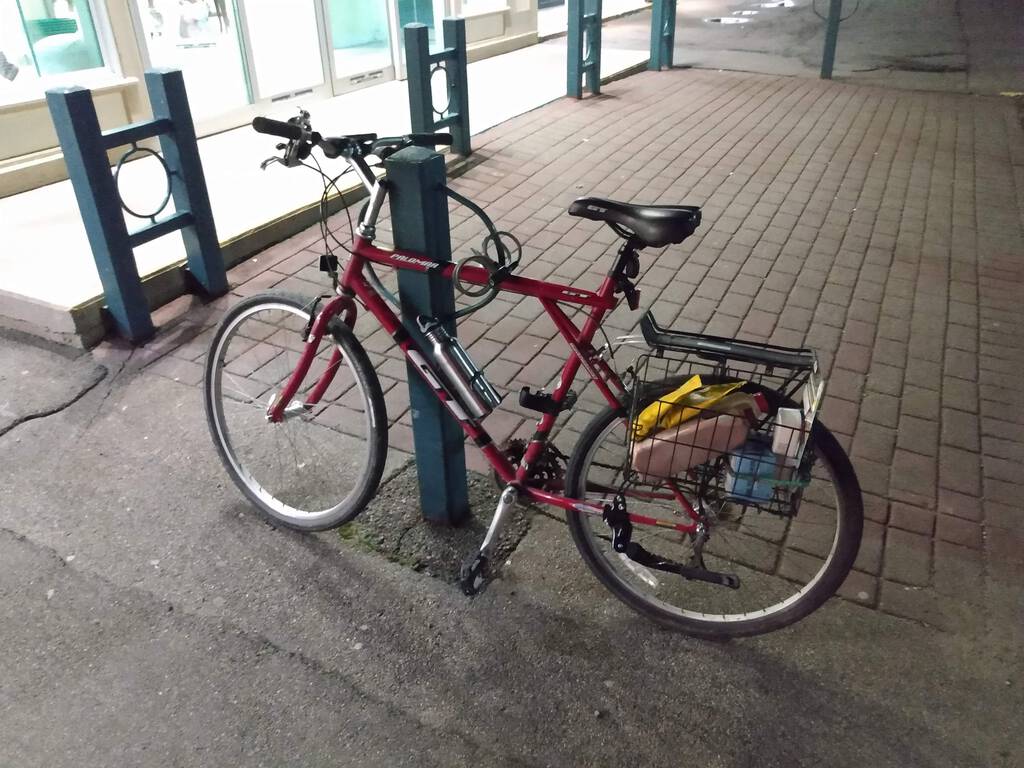
If you look carefully at my folding basket on the right you can see the I added some milk to the bill, white and chocolate, as I realized we were out.
The cycle ride from 100 Prince Street to Home Hardware took 17 minutes; it was 4 minutes from Home Hardware to Parkdale Pharmacy, and then 12 minutes to get back home.
Kudos to both Home Hardware and Murphy Pharmacies for realizing that good cycling infrastructure is good business.
Had I opted for the typical plan for running these errands, I would have driven my car out to Canadian Tire and back, a total journey of 9 km, which, according to the EPA, would have seen me emitting about 2.2 kg of CO2.
 I am
I am